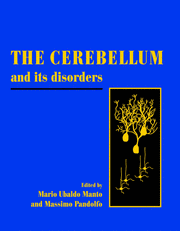Book contents
- Frontmatter
- Contents
- List of contributors
- Preface
- Acknowledgments
- Foreword by Sid Gilman
- PART I INTRODUCTION
- PART II THEORIES OF CEREBELLAR CONTROL
- PART III CLINICAL SIGNS AND PATHOPHYSIOLOGICAL CORRELATIONS
- PART IV SPORADIC DISEASES
- 10 Congenital malformations of the cerebellum and posterior fossa
- 11 Multiple system atrophy and idiopathic late-onset cerebellar ataxia
- 12 Corticobasal degeneration
- 13 Cerebellar stroke
- 14 Immune diseases
- 15 Infectious diseases: radiology and treatment of cerebellar abscesses
- 16 Other infectious diseases
- 17 Cerebellar disorders in cancer
- 18 Posterior fossa trauma
- 19 Thyroid hormone and cerebellar development
- 20 Endocrine disorders: clinical aspects
- PART V TOXIC AGENTS
- PART VI ADVANCES IN GRAFTS
- PART VII NEUROPATHOLOGY
- PART VIII DOMINANTLY INHERITED PROGRESSIVE ATAXIAS
- PART IX RECESSIVE ATAXIAS
- Index
14 - Immune diseases
from PART IV - SPORADIC DISEASES
Published online by Cambridge University Press: 06 July 2010
- Frontmatter
- Contents
- List of contributors
- Preface
- Acknowledgments
- Foreword by Sid Gilman
- PART I INTRODUCTION
- PART II THEORIES OF CEREBELLAR CONTROL
- PART III CLINICAL SIGNS AND PATHOPHYSIOLOGICAL CORRELATIONS
- PART IV SPORADIC DISEASES
- 10 Congenital malformations of the cerebellum and posterior fossa
- 11 Multiple system atrophy and idiopathic late-onset cerebellar ataxia
- 12 Corticobasal degeneration
- 13 Cerebellar stroke
- 14 Immune diseases
- 15 Infectious diseases: radiology and treatment of cerebellar abscesses
- 16 Other infectious diseases
- 17 Cerebellar disorders in cancer
- 18 Posterior fossa trauma
- 19 Thyroid hormone and cerebellar development
- 20 Endocrine disorders: clinical aspects
- PART V TOXIC AGENTS
- PART VI ADVANCES IN GRAFTS
- PART VII NEUROPATHOLOGY
- PART VIII DOMINANTLY INHERITED PROGRESSIVE ATAXIAS
- PART IX RECESSIVE ATAXIAS
- Index
Summary
Multiple sclerosis
Introduction
Multiple sclerosis (MS) is the most common chronic neurological disorder in young and middle-aged adults. It involves exclusively the central nervous system (CNS). It is an inflammatory disorder consecutive to the formation of venule-centered areas, or plaques, scattered haphazardly. These plaques contain reactive cells and harbor myelin and axonal damage. Whether remyelination is a constant feature is at issue, but, if it is present, it is clearly ineffective at restoring myelin and axonal integrity. The consensus is that MS is an atypical autoimmune disorder (Reder and Antel, 1983). A genetic contribution to the etiology has been deduced from family studies (Sadovnick et al., 1997, 1998). MS is twice as common in women than it is in men, and affects predominantly Caucasians (Whitacre et al., 1999). The most classical clinical manifestation of MS is a relapse, which is an acute or subacute episode of neurological dysfunction lasting several weeks, followed by a remission. Relapses are unpredictable in time course, severity, duration, and site of lesion. MS course is usually protracted, only five or six years of overall longevity being lost (Sadovnick et al., 1992). Although still incurable, therapeutic breakthroughs have been attained that partially decrease the formation of new plaques (Paty and Hartung, 1999).
Multiple sclerosis seems to be a modern affliction, there apparently being no mention of this disease in ancient medical texts, or in those of the Middle Ages. The earliest accounts of MS are of St Lidwina of Schiedam of Holland (1380–1433) by Godfried Sonderbank, and by Sir Frederick d'Este from the UK (1794–1848) in his diary (Firth, 1948).
- Type
- Chapter
- Information
- The Cerebellum and its Disorders , pp. 228 - 236Publisher: Cambridge University PressPrint publication year: 2001



